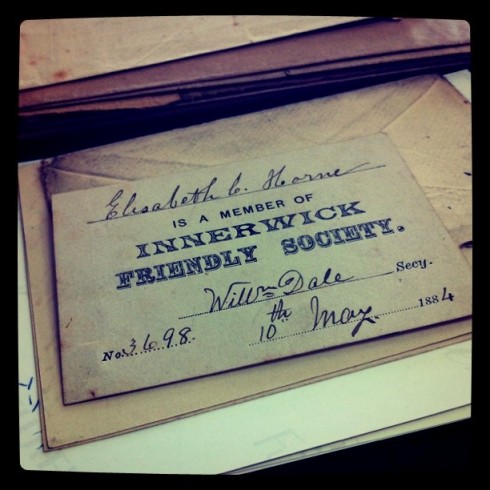Instant Scarcity
 Despite having created a robust world-wide network of information, it seems to me, now more than ever, that we’ve placed our history in peril.
Despite having created a robust world-wide network of information, it seems to me, now more than ever, that we’ve placed our history in peril.
The picture above is of a membership card to a friendly society, essentially an early form of insurance/mutual fund. Having been signed off on in 1884, the card sat, waiting in the back of an accordion file, till it was once again exposed to the light in 2011 – nearly a hundred and thirty years later.
Paper yellows, certainly, but look at the condition of that bit of red-tape: if the dues were up to date, even the most ornery of sticklers would be hard-pressed not to accept it in exchange for a claim.
[youtube_sc url=”http://www.youtube.com/watch?v=MFZo5PqvEak”]
In July 1962, a 1.44 megaton (6.0 PJ) United States nuclear test in space, 400 kilometres (250 mi) above the mid-Pacific Ocean, called the Starfish Prime test, demonstrated to nuclear scientists that the magnitude and effects of a high altitude nuclear explosion were much larger than had been previously calculated. Starfish Prime also made those effects known to the public by causing electrical damage in Hawaii, about 1,445 kilometres (898 mi) away from the detonation point, knocking out about 300 streetlights, setting off numerous burglar alarms and damaging a telephone company microwave link.
Future tests, unfortunately, only went on to prove that an atomic detonation over a populated area would result in damage to electronics exponential to the aftermath of Starfish.

What would archeologists make of our efforts, a thousand years from now, if all they had to observe from our culture were soda bottles and partially-decayed DVDs? Will they assume we were largely illiterate, having been enthralled by the semi-mythical device known as Telly-vision?
That sort of future doesn’t require an incident nearly as dramatic as a nuclear war, either – in a time of shortage, anything may be scavenged and re-purposed.
An elderly Georgian woman was scavenging for copper to sell as scrap when she accidentally sliced through an underground cable and cut off internet services to all of neighbouring Armenia, it emerged on Wednesday.
I’m not saying that we should all give up on the internet, nor am I implying that you should crank up your deskjet and get to printing every website you value, but we do need to consider the fragility of the basket we’ve constructed, even as we continue to plunk our eggy output into its depths.
(Big thanks to @elliesoderstrom (check out her blog, The Gig) for keeping Georgia on my mind.)
That card highlights for me the awfulness of modern paper. Most of the paper used in books over the last five or six decades has more acid than in the paper of ages past. Books from over a hundred (or more) years ago can still be found in very good condition while books now have a lifespan of only about fifty years before they yellow and crumble away. I am currently trying to read a series of paperbacks from 1968 and even though they were kept in good shape and not very worn it is a bit of a struggle to keep from tearing the pages. Assuming the internet goes kablooey and future generations have to discover ages past through physical artifacts, there will be a big gap in this era due to the loss of many books, magazines, and newspapers while much of the stuff from earlier eras will still be around. And how much information never gets printed anyway? So much of our knowledge exists only online.
More expensive books with archival and acid-free paper will still be around, but those will tell a skewed and incomplete story.
I have this terrible recurring nightmare (not really) regarding the collapse of civilization – when the alien researchers finally arrive to learn about our history, all they can find are glossy pages from ancient copies of Tiger Beat.
You make a great point about acidity in modern paper. I hadn’t really considered it, but it does explain some oddities I’ve encountered in used book stores.
Out of curiosity, what’s the paperback series?
“there will be a big gap in this era due to the loss of many books, magazines, and newspapers”
That might not be such a bad idea… after all, the way humanity destroyed itself will be clear even from much older material, no need to further embarrass ourselves by giving the full details…
“Will they assume we were largely illiterate, having been enthralled by the semi-mythical device known as Telly-vision?”
Their assumption would be right – ever tested the cultural level of one of today’s 16-year-olds? They can barely read.
Great post, Skinner. I must say that I’m sorry so much of the valuable information and memorabilia will disappear, but I think it’s for the best when it comes to a lot of other stuff :-/
I’d be interested to hear what Barry has to say regarding literacy and children – is the internet helping us return to the written word, or are kids just picking up a bunch of st00pid sp3llingz?
It is a return to the written word (ignoring bad spelling, poor grammar, emoticons, etc) in terms of communication, so in the strictest sense of being able to read and write it is a return to literacy.
But I don’t call that literacy. Literacy requires context and understanding, background and forethought. It requires a broad knowledge base. A kid who can read and write well enough to use their instant messenger to say “wht up dawg?” isn’t literate.
You may argue that your Flash Pulp, my rants, etc, are within my criteria of literacy and if the kids read them online then they are literate. That would be true IF the kids were reading it. The people who go on the internet to read are already literate. And I am sure there is no way of knowing, but Flash Pulp’s average reader’s age skews older than “kids.”
And after that discourse I am off to write some fart jokes for my own blog. I am the Jekyll and Hyde of bloggers.
Unfortunately, I totally agree with Barry. I’m not sure what the situation is in the US, but here in Italy it’s really sad. There’s a number of kids who love to read, especially after the boom of fantasy novels, but that’s still a depressing minority. The average kid can barely understand a not too complicated, matter-of-fact sentence, but fly a little bit higher and you’ll lose them in no time. It’s really the mental process that’s gone amiss, they’ve lost the ability to formulate abstract thoughts, the capacity to elaborate. Not to mention the horribly small number of words they know. Anything that’s not part of their daily life (and only those fragments that stir their interest, usually out of perceived self-interest…) doesn’t enter their vocabulary.
I’m becoming a grumpy old man. I’d better go read some fart jokes by Barry ;-P
This reminds me of a topic I want to discuss during the next FlashCast – namely how pop culture is geared towards children these days, and probably shouldn’t be.
OH MY GOD you hit on a pet peeve. There has always been a youth culture but it has never been the prevalent culture as it nearly is now. I can go on and on but I’m not at home base. Make it a topic for Flash Cast and expect a longwinded email from me for it and if you don’t, shoot me a reminder.
Boom-bam-baby! What a great post! Especially your conclusion. I feel like needle-pointing on a pillow so it will survive the nuclear apocalypse.
I hardly the deserve the shout-out you gave me, but thank you very much! 🙂 Cheers! This blog needs to be on my reader…
Many thanks, and, bah, inspiration always deserves a hat-tip.
The more readers, the merrier. 😉